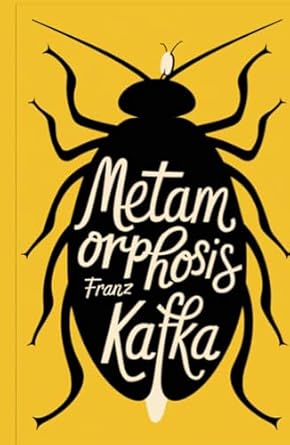The Metamorphosis by Franz Kafka
About the Author
Franz Kafka was a German-speaking Bohemian writer whose surreal and haunting stories probe themes of alienation, guilt, and the absurdity of modern life. Although Kafka published only a few works during his lifetime, his posthumously released novels and stories made him one of the most influential writers of the 20th century. His unique voice gave rise to the term “Kafkaesque,” describing nightmarishly complex, oppressive situations that mirror the human struggle for meaning.
Story in Brief
The Metamorphosis tells the story of Gregor Samsa, a traveling salesman who wakes up one morning to find himself transformed into a giant insect. Unable to communicate or work, Gregor becomes a burden to his family, who slowly withdraw from him in shame and resentment. The novella explores identity, isolation, and the painful consequences of being dehumanized in a world driven by duty and appearance.
Challenges / Bans
While not widely banned in modern times, The Metamorphosis has faced censorship and removal in various countries and schools for its dark psychological themes and perceived existential pessimism.
Early to Mid-20th Century (Europe): Banned under Nazi Germany for being “decadent” and “anti-German,” as Kafka’s works were considered subversive and contrary to nationalist ideals.
Cold War Era (Eastern Bloc): Suppressed for its anti-authoritarian tone and bleak portrayal of bureaucracy.
U.S. School Challenges: Occasionally removed from curricula for being “too disturbing,” “hopeless,” or “morbid” for young readers.
Why It’s Still Important
The Metamorphosis remains one of literature’s most powerful examinations of what it means to be human in an uncaring world. It compels readers to think about empathy, self-worth, and how society treats those who are different. Banning it silences a story that helps readers understand both alienation and compassion.

